The school board is about to vote on a policy that censors student journalists. We created a policy that promotes the first amendment. Join us, along with hundreds of others, in urging the school board to pass our policy, Voices Unbound.
For direct action steps on how to help Theogony, please click this link.
Over the past year, we have shared stories that matter.
Some of these stories sent shockwaves through the community, such as the removal of administrators from the high school or the school district’s struggles to transport students between campuses. Others were less divisive — but equally important — like the mural that students painted at Bradlee Shopping Center or the remarkable 65-year teaching career of Louis Kokonis.
Our reporting has encapsulated the fundamental role of journalism: shining a light on the untold and underrepresented stories that shape lives. Now, all of that work is under threat.
After we published an update to our investigative series “Inside the High School Project,” Central Office leadership told school administrators to edit our articles that are of “high interest.”
That is called administrative prior restraint, and it is a dangerous form of censorship. Dozens of leading scholastic, journalism and legal institutions have denounced it, from the Journalism Education Association to the American Bar Association. In fact, we could not find a single organization that supports administrative prior restraint.
For decades, students have independently run operations without the interference of Central Office.
But now, all of that is gone. Recently, the school district released a draft policy and regulation that codify the censorship policy in detail.
The policy changes also revoke student ownership of content — so students no longer own the poems they publish in the magazine — and prohibit Theogony from taking photographs at school without getting approval from each person in the frame. (School board members have since said this clause would not apply to photographs of large crowds.)
In an early draft, the regulation said students would “lose journalistic privileges” if they worked on stories for city newspapers without the permission of the school district public relations team.
This policy is straight from the playbook of authoritarian governments that fear criticism. A school district that claims to welcome equity and student voice should be nowhere near it.
As student journalists at the only public high school in Alexandria, we hold a unique perspective and opportunity to provide insights to the community. We take pride in the fact that our stories are factual and reflect the experiences of students and staff alike.
When the school district can filter out information they do not like, that is not true accuracy — it inherently biases and corrupts the integrity of our newspaper. Central Office staff are government officials. They are not trained in media ethics. And if they truly believed in democracy, they would not try to control the press.
Like any competent news organization, we report the facts. Last year, we wrote 107 stories. Ninety-seven were generally received as positive accounts of the school or district, and the remaining 10 reported seemingly controversial school or district actions. This aligns with our collective impressions of the school district — about 90 percent is great, and about 10 percent needs improvement. In an attempt to serve as a platform for all perspectives, we welcome an op-ed from district leadership explaining their choices.
After being informed of the censorship procedure, we requested multiple times to meet with Superintendent Melanie Kay-Wyatt. When Kay-Wyatt replied to our emails, she did not reference our request to meet. (Our request still stands should Kay-Wyatt change her mind.)
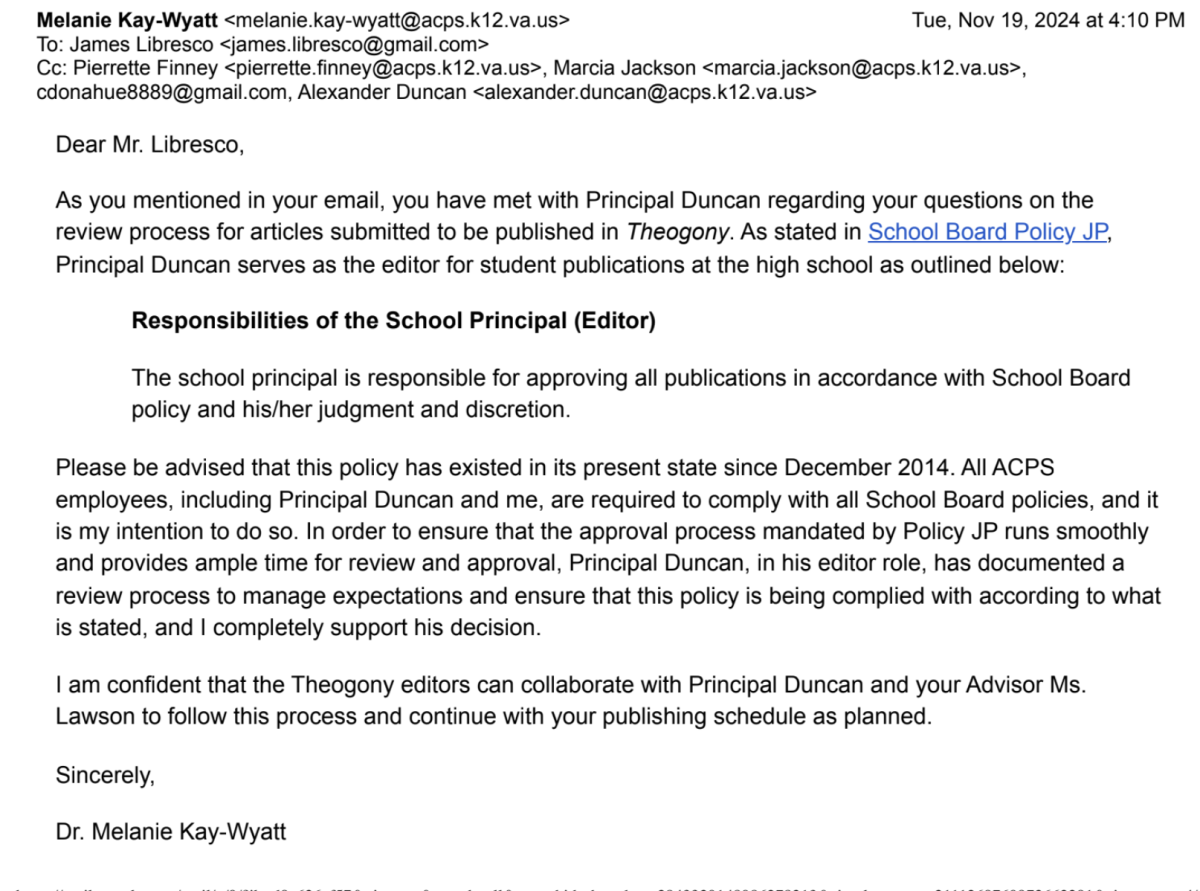
We have, however, met with the school board committee that drafts policy. While they have certainly listened to our perspectives, their actions do not reflect that. The original policy includes arguably one of the 12 elements we requested, and it is unclear what will change.
So we ask ourselves, “Why is the school district now censoring students for the first time in decades? Why is the district specifically targeting Theogony? Why is the district not forcing other student publications, including Titan Media Alexandria and the yearbook, to comply? Why does the policy not apply to our articles highlighting the many positives of our district? Why does it only apply to what administrators deem ‘topics of interest?’”
In an age where many believe democracy in our country is under threat, Kay-Wyatt, her Central Office and now maybe the school board are assaulting one of democracy’s most important assets: a free and independent press. This cannot stand.
How You Can Help
Soon, the school board will vote to either uphold or revise the current — censorship-enabling — policy.
This is where we need your help.
In collaboration with other student publications, we created a just and equitable school board policy that prohibits viewpoint-based censorship. We call this policy Voices Unbound, and it has been endorsed by Sen. Adam Ebbin, Mayor Alyia Gaskins, almost all City Council members and five national policy organizations.
Unlike the ACPS proposed policy, Voices Unbound affirms the role of a free press and restores full First Amendment protections to student journalists and their faculty advisers. It requires administrators to meet a reasonable burden to block content from being published. And it leaves most editorial decisions in the hands of students — who have been trained for more than a year on how to make those decisions.
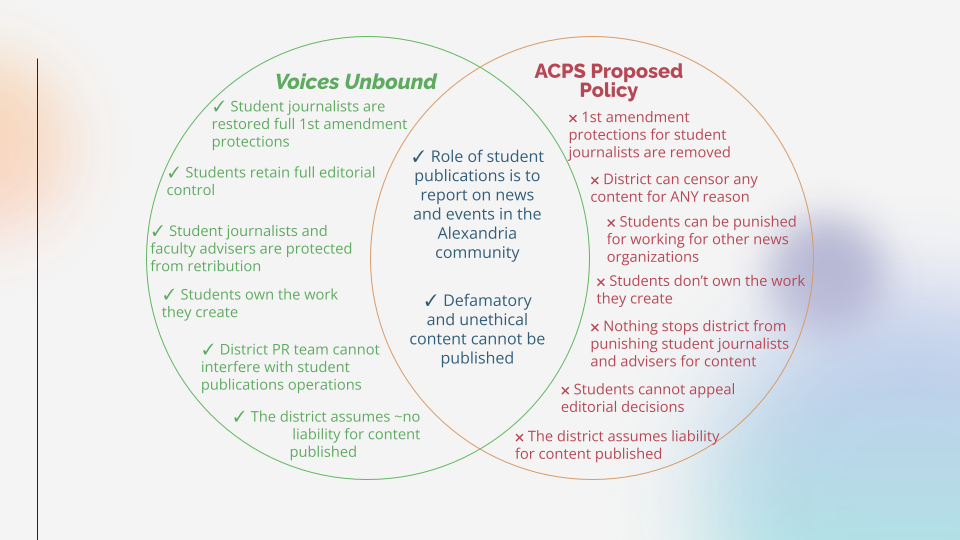
Under Voices Unbound, if student-produced content is obscene, libelous, or otherwise unfit for publication, it can be blocked. But there must be justification — not just, “We don’t like this.”
Recently, leaders of student publications at ACHS — including Theogony, Labyrinth (magazine) and Cerberus (yearbook) — met with the school board governance committee for a listening session to share our perspectives and support for Voices Unbound. While we appreciated the chance to speak about the overall policy, we remain disturbed that the school board has not immediately taken action to stop the censorship procedure or proposed policy.
Further, we are disturbed that after months of reassurances, committee members did not include any of our requests in the proposed policy available online.
To the school board: we urge you to adopt Voices Unbound and reject the censorship policy. The time to act is now. Will you stand on the right side of history as the board who upheld the press freedom at a turning point in the nation? Or will you be remembered as the board who silenced its own students? Alexandria will not forget.
To our readers: we thank you for your continued support, and we ask for your help. Please, visit our action steps document. Sign our petition. Email the school district using this easy, pre-addressed template. Sign up to speak at school board meetings. Do not back down. The future of student journalism in Alexandria depends on it.
Reader, we need your help. Please visit this document for quick and easy steps you can take to support us.
Typically, editorials reflect the opinion of Theogony’s editorial board, but this editorial represents the consensus view of Theogony’s entire staff. Staff Adviser Kamilah Lawson is not involved in the writing or editing processes of editorials.
This article was updated May 30 to include additional information.
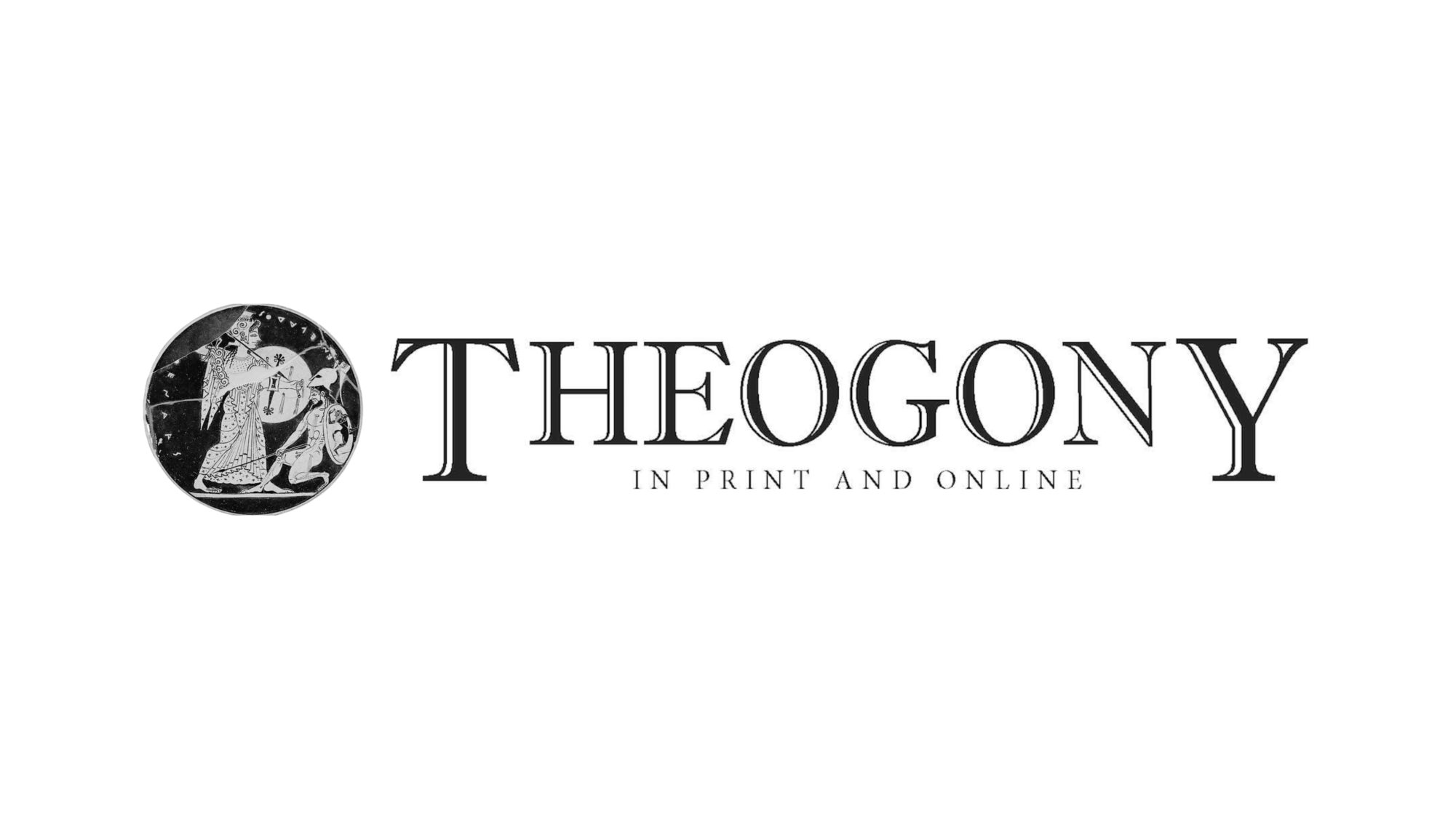




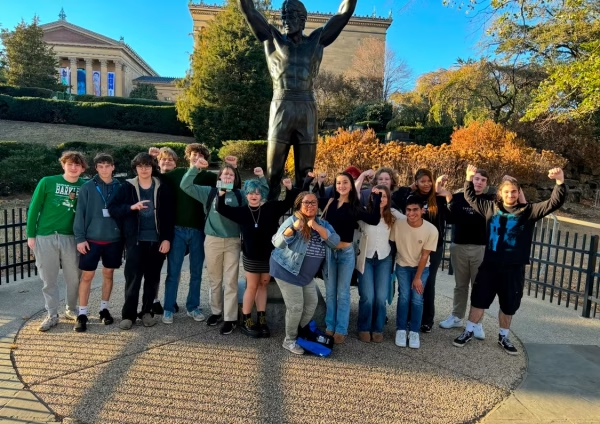



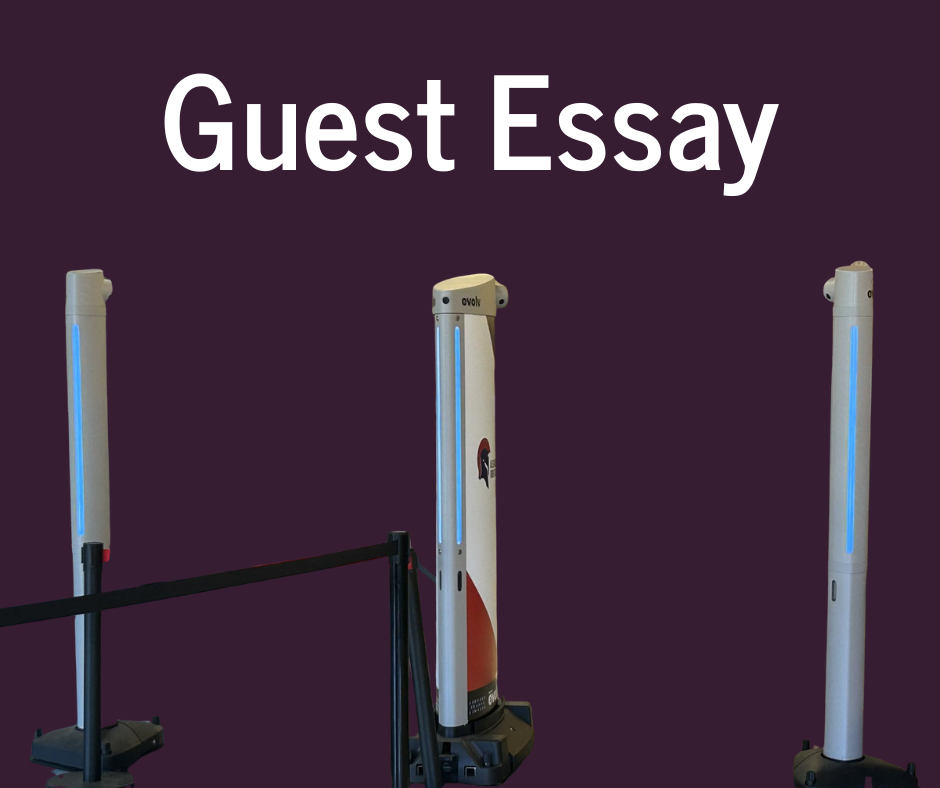
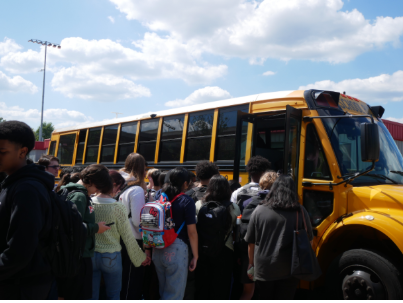



Sarasue French • May 10, 2025 at 7:42 am
Yay, student journalists!
Tricia Maher-Miller • May 1, 2025 at 4:32 pm
Thank you for making the community aware of this issue. May I request that, for those who choose to email our superintendent and School Board, that we address our superintendent as Dr. Kay-Wyatt?
Thank you, Tricia Maher-Miller, Alexandria
Chloe Yokitis • May 9, 2025 at 10:44 am
Hi! According to the widely accepted AP style of writing, “Dr.” is only to be used when referring to those with a medical degree. See here: tinyurl. com/2phwxnhj